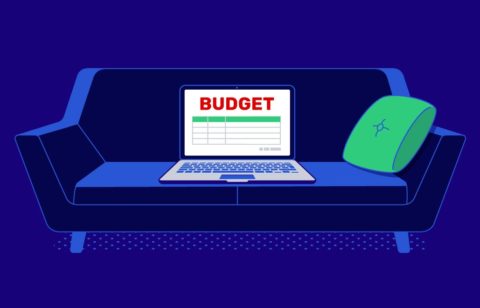Did you know that budgeting tips can help you achieve independence? You can do just about anything, including living on your own, if you know how to spend wisely.
You see, the financial problems of consumers are not necessarily due to a lack of finances. Even if you are earning a low income, you do not have to give up doing what you want. For instance, if you want to live on your own, you can make it happen. If you are tired of having noisy or messy roommates, you do not have to suffer because you do not think you can swing the cost. You can afford to rent your own place as long as you know how to implement certain budgeting tips.
Of course, the ideal scenario is to own your home. However, current economic circumstances can make that an impossible dream. This is especially true for young adults who are burdened with student loans. Debt is the reason some people have passed up homeownership for renting.
According to CNBC, rent prices swelled during the first half of 2022, hitting a national average of $2,495— a double-digit increase year-over-year. Despite that increase, the rental vacancy rate is currently low.
We all know what happens when demand is high, and supply is low – the price of rent goes through the roof. Given this data, do you really think that basic budgeting tips can still help you afford living on your own?
Absolutely.
People Also Read
How different will budgeting be when you live on your own?
It is possible to be content with your living space despite having a low-income household. As long as you have what you need to live comfortably, you can learn to be happy with what you have. The key is a simple formula of building your lifestyle around your net income after removing a portion for your monthly savings. Anything that is left over is your budget. You need to build your life based on this amount and never push the limits.
Once you learn to live by these rules, you will know how to navigate living alone without a roommate— regardless of how much you are earning.
USNews.com published an article about the cost of living alone. Let’s explore four important considerations when you are planning on living without roommates.
Rent
If you are living alone, you are solely responsible for paying the rent. The article cited an example of apartment rates in Chicago. A 1-bedroom apartment that costs $1,607 is still more expensive compared to a 2-bedroom apartment where the costs are shared at $902 each. The rates will depend on the city you live in, but the concept is generally the same – you pay more to live alone.
Utilities
Since you are the only one living at home, your water, Internet and electric bills will fall solely on your shoulders. On the other hand, you also have more control over how much each utility is used. If you want to save money, you can choose to lower the heat by simply wrapping yourself with a blanket. And you do not need to debate it beforehand with a shivering roommate.
Furnishings
Renting a furnished place to live is usually more expensive. That could mean you will need to buy an unfurnished home to save money. Make sure you can handle the costs of everything from a bed and decorations to the essentials like cleaning supplies. Remember to only purchase what you need, the like-haves can wait.
Bills
According to the article, control is one of the financial benefits to living on your own. You decide what you want to subscribe to based on your budget and your own personal preferences. And the TV remote control is all yours! Sure, living on your own can cost more. But it can provide invaluable privacy and the freedom to be loud, go to sleep early, throw a party—anything goes!
Prepare to live alone
Budgeting requires that you start setting aside money for expenses at the beginning of the month. And don’t forget that when you move, you will also need to pay a security deposit and the first month’s rent. Make sure you have the extra money in hand for a smooth transition. The average cost of a local move is $1,250. Check out Moving.com to calculate your anticipated fees to avoid any unpleasant surprises.
Tips to make living alone fit your budget
According to Rent.com, the average cost of a one-bedroom in August 2022 was $1,769, a 39% increase from this time last year. Of course, costs vary according to where you live. To cover this higher amount, you will need to earn between $24,500 and $64,600 a year. There are always ways to cut corners if your salary falls short.
Follow these budgeting tips to afford your own place:
Make a budget and stick with it.
If your expenses add up to more than your income, you may have to sacrifice certain luxuries. If there is something you can live without, live without it. It is worth it if the tradeoff is a place of your own.
Build up your emergency fund.
Having an emergency fund helps improve your financial situation in the case of job loss, medical emergencies, car troubles, or other unexpected life events. If something does happen, you will be financially prepared to deal with it even if it is a dollar a day.
Carefully choose where you live.
Some cities are cheaper to live in than others, so where you live matters to your wallet. If you reside in an expensive city on your own, you might want to rent a small space for yourself. There are a lot of beautiful studio units that you can settle into and call your own by adding personal touches.
Buy secondhand furniture.
While brand new furniture is a nice have, there is nothing wrong with buying second-hand. You can find many good deals at the Salvation Army or consignment shops. Some of what you find might even be brand new. Or go around the neighborhood and see if there are yard sales or other local shopping exchanges. You can also ask family and friends if they can give you any old furniture or household items that they no longer use.
Plan your household budget carefully.
Prioritize your spending from the most to least important. Paying for your rent/mortgage is probably more important than a cute mini couch for your furry friend.
These budgeting tips can help you afford living without a roommate regardless of your income. But think carefully before taking this momentous step. Along with the freedom of living alone come the financial responsibilities of being on your own.









